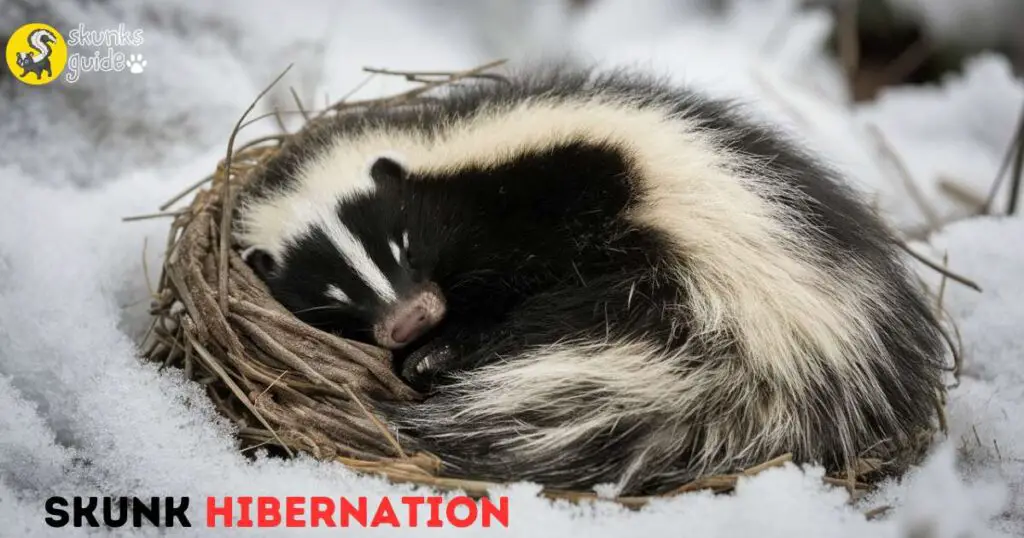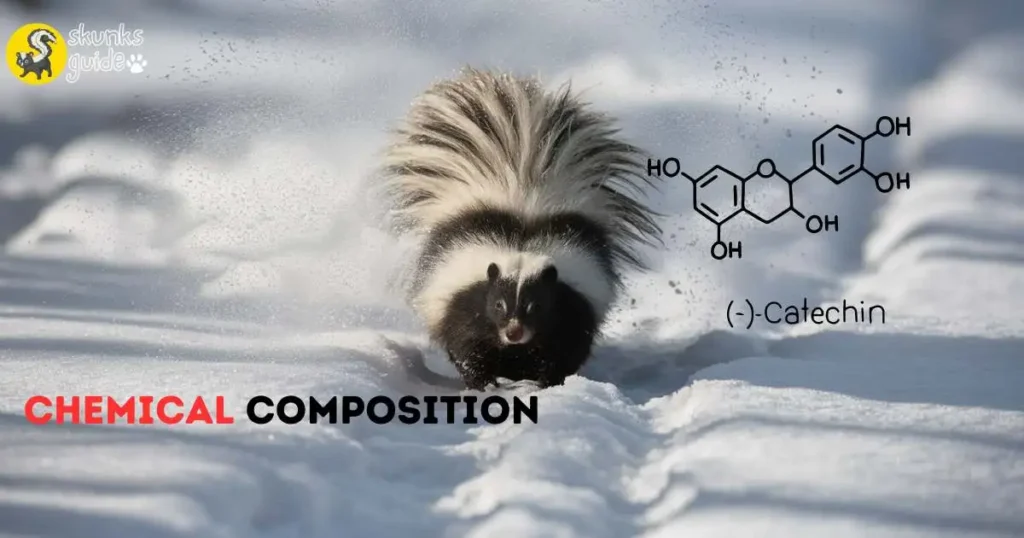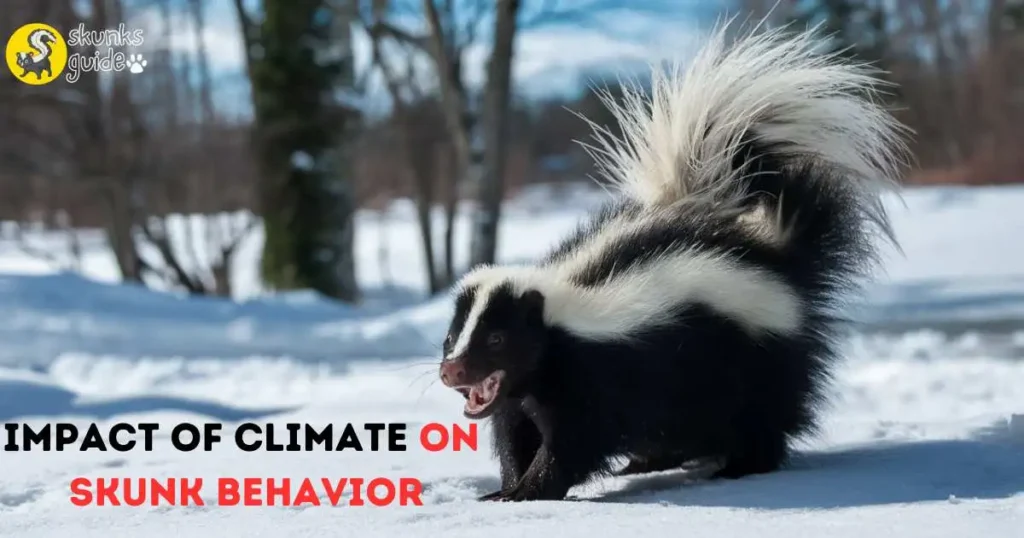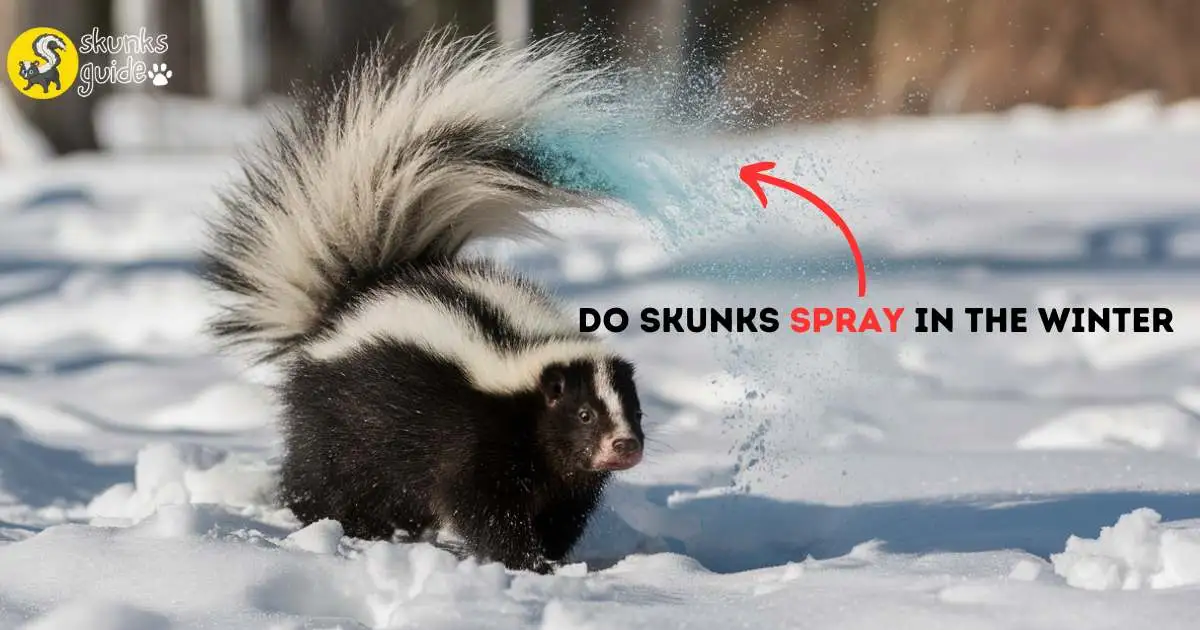Can Skunks Spray in the Winter?
Last updated on June 22nd, 2025 at 12:30 am
Yes, skunks can spray in the winter, although it happens less frequently. They may conserve their resources during colder months. During the cold months, skunks slow down and rest in their dens, relying on stored fat to keep them going. Even though they’re less active, they can still spray if they feel scared. As someone who’s spent a lot of time studying these animals, I’ve found that knowing how skunks behave in winter can help people avoid unpleasant encounters. Keep reading to learn more about how these creatures survive the winter and how you can stay safe around them.
Myths Vs. Facts: Skunk Spray In Winter
Many people believe skunks don’t spray in winter. This idea creates confusion. Understanding the truth behind skunk behavior helps us appreciate these animals. Let’s dive into the common myths and what science really says.
Common Misconceptions
- Skunks Hibernate: Some think skunks hibernate in winter.
- Skunks Don’t Spray When Cold: Many believe cold weather stops skunks from spraying.
- Skunk Spray is Only for Defense: Some think skunks only spray when threatened.
These misconceptions can lead to dangerous encounters. Skunks are active year-round. They can spray anytime, regardless of the season.
What Science Says
Studies show skunks do not hibernate. They enter a state called torpor. In this state, their activity slows down but does not stop. Skunks can still spray during this time.
| Season | Skunk Activity | Ability to Spray |
|---|---|---|
| Winter | Active, but less frequent | Yes |
| Spring | Highly active | Yes |
| Summer | Very active | Yes |
| Fall | Preparing for winter | Yes |
Skunks have a limited amount of spray. They use it wisely. They will spray if they feel threatened, even in winter.
Understanding these facts helps reduce fear and misconceptions about skunks. Respect their space and they usually won’t spray.
Understanding Skunk Hibernation
Skunks experience unique behaviors during the winter. They enter a state of rest to conserve energy. Understanding this hibernation process helps us learn about their habits.

Torpor Vs. True Hibernation
Skunks do not undergo true hibernation. Instead, they enter a state called torpor. Here are the differences:
| Feature | Torpor | True Hibernation |
|---|---|---|
| Duration | Short periods | Extended periods |
| Body Temperature | Lowered slightly | Significantly lowered |
| Awakening | Quickly awakens | Gradual awakening |
During torpor, skunks can wake up easily. This helps them respond to threats. They may also search for food if needed.
Impact On Skunk Defense Mechanisms
Skunks rely on their spray as a defense. During winter, their activity decreases. This affects their ability to spray.
- Skunks conserve energy in torpor.
- They may not spray as frequently.
- Stress can cause them to spray when disturbed.
Understanding these defense mechanisms is vital. It helps us appreciate skunks’ survival strategies in harsh conditions.
Triggers For Winter Spraying
Understanding what triggers skunks to spray in winter helps in prevention. Skunks have specific reasons for using their spray. These reasons often relate to threats and food availability.
Threats That Cause Skunks To Spray
Skunks are generally shy creatures. They prefer to avoid conflict. However, certain threats can make them feel cornered. Here are common threats that may trigger spraying:
- Predators: Animals like coyotes or dogs can scare skunks.
- Humans: Sudden movements can alarm skunks.
- Other Skunks: Rival skunks may provoke a defensive response.
These threats can cause skunks to feel endangered. In such situations, they will use their spray as a defense mechanism.
Availability Of Food And Its Effect
Food availability plays a significant role in skunk behavior. Skunks search for food during winter, even when it’s cold. Their diet consists mainly of:
| Food Type | Description |
|---|---|
| Insects | Skunks eat beetles and grubs. |
| Fruits | They enjoy berries and fallen fruits. |
| Small Animals | Skunks hunt mice and small birds. |
If food is scarce, skunks may feel stressed. This stress can lead to more aggressive behavior. Skunks are more likely to spray if they feel threatened while searching for food.
Skunk Spray: Chemical Composition
Understanding the chemical makeup of skunk spray is essential. This unique liquid helps skunks defend themselves. It consists of various compounds that create a powerful odor. Let’s explore these components and their effectiveness in cold weather.

Components Of Skunk Musk
Skunk spray contains several key components. Each plays a role in the spray’s potency. Here’s a breakdown:
| Component | Function |
|---|---|
| Thiols | Responsible for the strong odor |
| Thioacetates | Convert to thiols upon contact with moisture |
| Butyric Acid | Adds a rancid smell |
| Other Organic Compounds | Contribute to the overall scent profile |
These components work together to create a highly effective defense mechanism. Skunks can spray their musk up to 15 feet away. This makes them a formidable opponent for predators.
Effectiveness In Cold Weather
Cold weather affects many animals, but skunks are unique. Their spray remains effective in winter. Here are some reasons why:
- Chemical Stability: Skunk musk does not freeze easily.
- Strong Odor: The smell remains potent even in low temperatures.
- Behavior: Skunks can still spray when threatened.
In winter, skunks may not be as active. They often enter torpor, a state of reduced activity. However, their ability to spray does not diminish. This means they can defend themselves at any time.
Dealing With Skunk Encounters In Winter
Winter can bring unique challenges when it comes to skunks. They are less active, but they can still spray if threatened. Understanding how to handle these encounters is crucial for safety and comfort.
Preventive Measures
Taking steps to prevent skunk encounters is essential. Here are some effective measures:
- Seal Entry Points: Check for gaps in your home. Seal any holes in the foundation or walls.
- Secure Garbage: Use tight-fitting lids on trash cans. Store food waste indoors.
- Remove Attractants: Clear your yard of fallen fruit. Keep pet food indoors.
- Use Deterrents: Consider motion-activated lights. Use citrus peels around gardens.
Steps To Take After Being Sprayed
Getting sprayed by a skunk can be a distressing experience. Follow these steps to minimize the odor:
- Stay Calm: Panic won’t help. Remain composed.
- Wash Clothing: Remove all clothing immediately. Wash in hot water with detergent.
- Use a Skunk Odor Remover: Mix the following solution:
| Ingredient | Amount |
|---|---|
| Baking Soda | 1/4 cup |
| Hydrogen Peroxide (3%) | 1 quart |
| Liquid Dish Soap | 1 teaspoon |
- Apply the Solution: Use it on affected areas. Rinse thoroughly after 5-10 minutes.
- Ventilate: Open windows to air out the space. Consider using fans.
- Seek Professional Help: If the odor persists, consult a professional cleaner.
Staying aware and prepared can help minimize issues with skunks in winter.
Impact Of Climate On Skunk Behavior
Climate plays a crucial role in how skunks behave. Changes in temperature and weather patterns can affect their activities. Understanding these effects helps us learn about skunk behavior, especially their spraying habits.

Global Warming And Wildlife Patterns
Global warming changes wildlife patterns. Skunks, like many animals, respond to these shifts.
- Temperature Increase: Higher temperatures can lead to earlier springs.
- Food Availability: Warmer weather may change food sources.
- Habitat Changes: Skunks may relocate due to altered environments.
These changes impact skunk behavior:
| Behavior | Impact of Climate |
|---|---|
| Foraging | Increased activity during warmer months. |
| Mating | Earlier mating seasons due to warmer temperatures. |
| Spraying | More frequent spraying in response to stressors. |
Skunks’ Adaptation To Changing Climates
Skunks adapt to survive in changing climates. Their ability to adjust is vital for their survival.
- Behavioral Adaptations: Skunks may change activity times.
- Diet Changes: They will eat what is available.
- Habitat Flexibility: Skunks may move to new areas for better resources.
These adaptations help skunks cope with climate change. Understanding these behaviors aids in wildlife conservation efforts.
Frequently Asked Questions
What Happens To Skunks In The Winter?
Skunks enter a state of dormancy during winter. They seek shelter in burrows or dens, often sharing space with other animals. Their metabolism slows, allowing them to conserve energy until warmer weather returns. Skunks wake up in early spring to resume their active lifestyle.
What Keeps Skunks Out Of Your Backyard?
To keep skunks out of your backyard, secure trash cans with tight lids. Remove food sources like pet bowls and fallen fruit. Trim dense shrubs and grass to eliminate hiding spots. Use motion-activated lights or sprinklers to deter them. Strong scents, like citrus or vinegar, can also repel skunks effectively.
Why Do I Smell Skunk In The Winter?
You might smell skunks in winter due to skunks being active during mild weather. They can spray even in colder months if threatened. The smell can linger, especially in low-lying areas. Wildlife activity in your area may also contribute to occasional skunk odors during winter.
Conclusion
Skunks can indeed spray in winter, though it’s less common. Cold weather affects their activity levels, but they still defend themselves if threatened. Understanding skunk behavior helps avoid unwanted encounters. Stay informed and take precautions to protect yourself and your pets.
Knowledge is key to coexisting with these unique animals.

